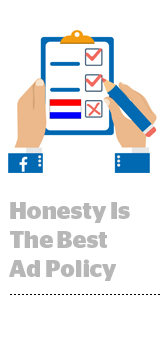
Facebook said Monday it will add 1,000 employees to its global ads review teams over the next year to put the kibosh on foreign state-sponsored ads.
The company will examine not just the content of the ad, but also the context in which it was bought and the targeting parameters used. Facebook’s ads review system will change to take these signals into account.
Facebook, sensitive to how some users hijacked its free-form employer and education fields to foment racism and hatred, also will proactively work to identify targeting parameters that could be used to contravene its policies before an ad runs.
Ads with certain types of targeting – ”Jew haters” would seem to qualify – will be sent for additional manual review before hitting the platform.
Beyond beefing up its manual review process, Facebook will invest more in machine learning to flag and remove ads at a larger scale.
Facebook also will hand over the more than 3,000 Russia-linked ads it discovered on its platform to Congress, many of which “appear to amplify racial and social divisions,” Facebook’s VP of global policy, Joel Kaplan, wrote in a blog post.
The content guidelines on Facebook are about to get a lot stricter and more transparent. As a follow-on to Mark Zuckerberg’s recent promise to “bring Facebook to an even higher standard of transparency,” Facebook will make it more difficult for buyers to hide who they are when they pay for an ad.
Unlike on television and other traditional media, where advertisers are required by law to disclose who paid for a political ad, there’s no such disclosure requirement for online political advertising.
As part of that effort, it looks like Facebook is getting rid of unpublished or dark posts that allow brands and publishers to target users with content, usually ads, doesn’t actually live on their pages, meaning that only people within the target audience could see them. Going forward, users will be able to see all of the other ads a page is running even if they weren’t targeted.
It’s also about to get harder for advertisers to hide who they are. Facebook is updating its policy to require “more thorough documentation” from advertisers that want to run US federal election-related ads, Kaplan wrote. Before an advertiser is approved to buy an ad, it will have to confirm the business or entity it represents, although that doesn’t necessarily help if an organization creates a shell corporation.
This post was syndicated from Ad Exchanger.

More Stories
By the Book: How ‘The Fugitive’ Director and an Investigative Journalist Collaborated on 2024’s Timeliest Thriller
The Best Holiday Ads of 2024
The Year in Ratings: How the Major News Outlets Performed in 2024